|
Books Should Be Free Loyal Books Free Public Domain Audiobooks & eBook Downloads |
|
|
Books Should Be Free Loyal Books Free Public Domain Audiobooks & eBook Downloads |
|
Literature |
|---|
|
Book type:
Sort by:
View by:
|
By: Henry Adams (1838-1918) | |
|---|---|
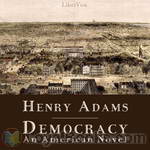 Democracy - An American Novel
Democracy - An American Novel
Not until after his death in 1918 was it revealed that Henry Adams was the anonymous author of Democracy, which had been published to great acclaim in 1880. Though the book avoids dates and the characters are fictitious, the setting is no doubt that of Washington in the 1870s, the age of Presidents Grant and Hayes. The young widow, Madeleine Lee, wealthy and independent, is the protagonist, who leaves her New York for Washington to turn her intelligence to politics and to see what makes her country tick... | |
By: Henry Blake Fuller (1857-1929) | |
|---|---|
 Bertram Cope's Year
Bertram Cope's Year
This novel was perhaps the most daring and affirmative LGBT literature of the first two decades of the 20th century in America. In this story, Bertram Cope is a young college instructor, about twenty-four years old ("certainly not a day over twenty-five"), who is pursued by men and women, both younger and older than himself. In writing this novel, Fuller had to carefuly craft his plot schemes so as not to offend the sensibilities of publishers. As a result, today's reader is left somewhat, but not entirely, confused about the precise feelings that characters develop for one another by the end of the book... | |
By: Henry David Thoreau (1817-1862) | |
|---|---|
 Walden
Walden
Two years, two months and two days! This is what forms the time line of one man's quest for the simple life and a unique social experiment in complete self reliance and independence. Henry David Thoreau published Walden in 1884. Originally drafted as a series of essays describing a most significant episode in his life, it was finally released in book form with each essay taking on the form of a separate chapter. Thoreau's parents were in financial straights, but rich intellectually and culturally... | |
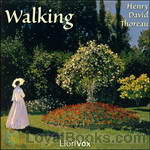 Walking
Walking
This was originally a lecture given by Thoreau in 1851 at the Concord lyceum titled “The Wild” . He revised it before his death and it was included as part of the June 1862 edition of Atlantic Monthly. This essay appears, on the surface, to be simply expounding the qualities of Nature and man’s place therein. Through this medium he not only touches those subjects, but with the implications of such a respect for nature, or lack thereof. | |
By: Henry Fielding (1707-1754) | |
|---|---|
 The History of Tom Jones, A Foundling
The History of Tom Jones, A Foundling
Tom Jones is considered one of the first prose works describable as a novel. The novel is divided into 18 smaller books. Tom Jones is a foundling discovered on the property of a very kind, wealthy landowner, Squire Allworthy. Tom grows into a vigorous and lusty, yet honest and kind-hearted, youth. He develops affection for his neighbor’s daughter, Sophia Western. On one hand, their love reflects the romantic comedy genre popular in 18th-century Britain. However, Tom’s status as a bastard causes Sophia’s father and Allworthy to oppose their love; this criticism of class friction in society acted as a biting social commentary... | |
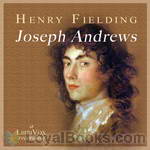 Joseph Andrews
Joseph Andrews
Joseph Andrews ... was the first published full-length novel of the English author and magistrate Henry Fielding, and indeed among the first novels in the English language. Published in 1742 and defined by Fielding as a ‘comic romance,’ it is the story of a good-natured footman's adventures on the road home from London with his friend and mentor, the absent-minded parson Abraham Adams. | |
 Journey from this World to the Next
Journey from this World to the Next
The narrator dies in the first sentence. Through relating his travels in the afterlife, Henry Fielding, author of Tom Jones and Joseph Andrews, gently satirizes life here on earth. | |
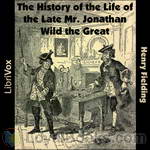 The History of the Life of the Late Mr. Jonathan Wild the Great
The History of the Life of the Late Mr. Jonathan Wild the Great
This novel is sometimes thought of as [Fielding's] first because he almost certainly began composing it before he wrote Shamela and Joseph Andrews. It is a satire of Walpole that draws a parallel between Walpole and Jonathan Wild, the infamous gang leader and highwayman. He implicitly compares the Whig party in Parliament with a gang of thieves being run by Walpole, whose constant desire to be a “Great Man” (a common epithet for Walpole) should culminate only in the antithesis of greatness: being hanged. | |
 Journal of a Voyage to Lisbon
Journal of a Voyage to Lisbon
Sailing voyage from England to Portugal in the mid Eighteenth Century, by one of the premier humorists, satirists, novelists and playwrights of his age. It was to be his last work, as his failing health proved unable to persevere much longer after the voyage. | |
 An Apology for the Life of Mrs. Shamela Andrews
An Apology for the Life of Mrs. Shamela Andrews
An Apology for the Life of Mrs. Shamela Andrews, or simply Shamela, as it is more commonly known, is a satirical novel written by Henry Fielding and first published in April 1741 under the name of Mr. Conny Keyber. Fielding never owned to writing the work, but it is widely considered to be his. It is a direct attack on the then-popular novel Pamela (November 1740) by Fielding's contemporary and rival Samuel Richardson and is composed, like Pamela, in epistolary form. Shamela is written as a shocking revelation of the true events which took place in the life of Pamela Andrews, the main heroine of Pamela... | |
 Amelia (Vol. 1)
Amelia (Vol. 1)
This is the first volume of a three volume novel. In this novel, Amelia marries William Booth against her mother's desires, and the two must move to London. Fielding explores the issues of married life such as infidelity and whether women's intelligence is equal to men's. | |
By: Henry Gilbert (1868-1937) | |
|---|---|
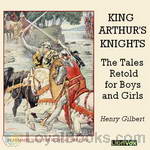 King Arthur's Knights: The Tales Retold for Boys & Girls
King Arthur's Knights: The Tales Retold for Boys & Girls
This book is an attempt to tell some of the stories of King Arthur and his Knights in a way which will be interesting to every boy and girl who loves adventures. (Introduction by Henry Gilbert) | |
By: Henry Handel Richardson (1870-1946) | |
|---|---|
 The Getting of Wisdom
The Getting of Wisdom
The Getting of Wisdom tells the story of Laura Rambotham, a 12-year-old girl who is just starting at her boarding school. This is based on Henry Handel Richardson’s experiences of her own school, the Prebysterian Ladies College in central Melbourne. The story goes through her friends and enemies and all the life of a boarding school in early 20th century Australia, and all the subjects and learning too. Laura learns a lot but her education does not satisfy her, and her social life is thrown upon her as very different from her peers. | |
 Australia Felix
Australia Felix
The story of Richard Mahony, a doctor trained in Edinburgh who comes to Ballarat in the gold rush of the 1850s. At first he runs a shop but later he marries and returns to medical practice. His story is interwoven with that of his wife’s brothers and sister. Even after his medical practice becomes successful he is still unhappy living in the colony and decides to return home to Britain. Richard is a restless irritable man whose character is said to be based on the author’s own father. This book is the first of the trilogy ‘The Fortunes of Richard Mahony’, but stands well on its own... | |
By: Henry James (1843-1916) | |
|---|---|
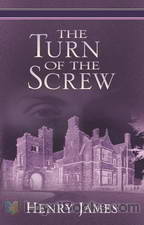 The Turn of the Screw
The Turn of the Screw
Christmas Eve. Guests round a fireside begin telling each other ghost stories. One of them relates a true incident involving the governess of his little nephew and niece. Strange events begin to take place, involving the housekeeper, a stranger who prowls round the grounds, a mysterious woman dressed in black and an unknown misdemeanor committed by the little nephew. The Turn of the Screw by Henry James was published in 1893 and it remains one of the best-known and admired works of this great American writer... | |
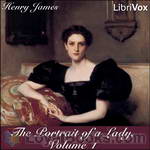 The Portrait of a Lady
The Portrait of a Lady
Regarded as one of James’ finest works, The Portrait of a Lady revolves around the life and the development of Isabel Archer as she embarks on a scrupulous journey of self-discovery, forced to choose between her individual freedom and the preset conventions of society. Moreover, the novel explores themes of existentialism, objectification of women, wealth, suffering, and the conflict between individual longing and social conformity. Set in the second half of the 19th century, the novel opens with the introduction of Isabel Archer, a naive young woman from Albany, New York... | |
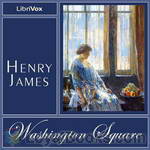 Washington Square
Washington Square
First appearing as a serial in Cornhill Magazine in 1880, Washington Square focuses on the strained relationship between father and daughter, which is instigated as a result of opposing personalities, viewpoints, and lack of affection. At the same time, James presents an insidious father, who would rather sacrifice his daughter’s happiness and condemn her to a lifetime of misery, simply to prove the accuracy of his prediction. Essentially a tragicomedy, the novel focuses on themes including family, deception, cruelty, manipulation, and opposed principles... | |
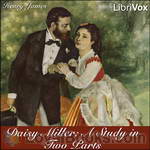 Daisy Miller: A Study in Two Parts
Daisy Miller: A Study in Two Parts
Daisy Miller is an 1878 novella by Henry James. It portrays the confused courtship of the eponymous American girl by Winterbourne, a compatriot of hers with much more sophistication. His pursuit of her is hampered by her own flirtatiousness, which is frowned upon by the other expatriates they meet in Switzerland and Italy. Her lack of understanding of the social mores of the society she so desperately wishes to enter ultimately leads to tragedy. | |
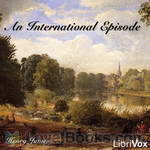 An International Episode
An International Episode
Two men visting the US from London meet a pair of charming women who return the visit the following year in London. Romantic intrigues, miscommunication and cultural faux pas abound in this short but delightful novel. | |
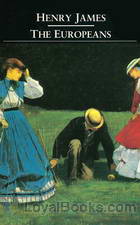 The Europeans
The Europeans
The Europeans: A sketch is a short novel by Henry James, published in 1878. It is essentially a comedy contrasting the behaviour and attitudes of two visitors from Europe with those of their relatives living in the ‘new’ world of New England. The novel first appeared as a serial in The Atlantic Monthly for July-October, 1878. James made numerous minor revisions for the first book publication. | |
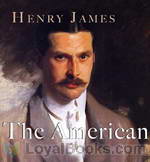 The American
The American
One of James’s early novels, The American plunges right in to one of the writer’s most enduring subjects, that of the innocent, or at least inexperienced, American abroad, seeking to come to terms with the social customs and conventions of an old European aristocracy (think of Daisy Miller, Portrait of a Lady, The Wings of the Dove and others). The aptly named Christopher Newman, having made a small fortune from business in California, has come to the Old World for the first time, determined to enlarge his experience by learning all he can of it... | |
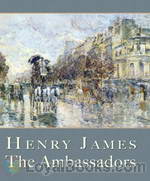 The Ambassadors
The Ambassadors
Henry James considered The Ambassadors his best, or perhaps his best-wrought, novel. It plays on the great Jamesian theme of Americans abroad, who finds themselves in an older, and some would say richer and more sophisticated, culture that that of the United States. The protagonist is Lambert Strether, a man in his fifties, editor of a small literary magazine in the manufacturing town of Woollett, Massachusetts, who arrives in Europe on a mission undertaken at the urging of his patron, Mrs. Newsome, to bring home her son Chadwick... | |
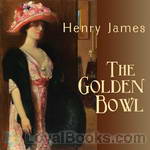 The Golden Bowl
The Golden Bowl
The Golden Bowl is a 1904 novel by Henry James. Set in England, this complex, intense study of marriage and adultery completes what some critics have called the “major phase” of James’ career. The Golden Bowl explores the tangle of interrelationships between a father and daughter and their respective spouses. The novel focuses deeply and almost exclusively on the consciousness of the central characters, with sometimes obsessive detail but also with powerful insight. | |
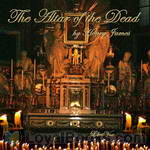 The Altar of the Dead
The Altar of the Dead
A fable of literally life and death significance, the story explores how the protagonist tries to keep the remembrance of his dead friends, to save them from being forgotten entirely in the rush of everyday events. He meets a woman who shares his ideals, only to find that the past places what seems to be an impassable barrier between them. Although James was not religious in any conventional sense, the story shows a deep spirituality in its treatment of mortality and the transcendent power of unselfish love. | |
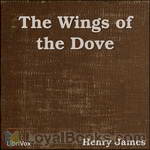 The Wings of the Dove
The Wings of the Dove
The Wings of the Dove, published in 1902, represents to my memory a very old–if I shouldn’t perhaps rather say a very young–motive; I can scarce remember the time when the situation on which this long-drawn fiction mainly rests was not vividly present to me. The idea, reduced to its essence, is that of a young person conscious of a great capacity for life, but early stricken and doomed, condemned to die under short respite, while also enamoured of the world; aware moreover of the condemnation and passionately desiring to “put in” before extinction as many of the finer vibrations as possible, and so achieve, however briefly and brokenly, the sense of having lived. | |
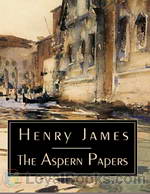 The Aspern Papers
The Aspern Papers
One of James’s favorite short novels, the Aspern Papers tells of the efforts of the nameless narrator to procure the papers of a famous, but now dead, American poet. His attempts to secure them from the poet’s former lover and her niece, now recluses in Venice, are stymied both by them, and by his own mistakes in his quest. | |
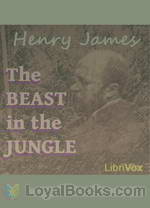 The Beast in the Jungle
The Beast in the Jungle
'The Beast in the Jungle' is a 1903 novella by Henry James, first published as part of the collection, The Better Sort. Almost universally considered one of James' finest short narratives, this story treats appropriately universal themes: loneliness, fate, love and death. The parable of John Marcher and his peculiar destiny has spoken to many readers who have speculated on the worth and meaning of human life. | |
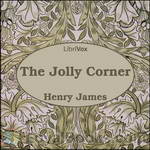 The Jolly Corner
The Jolly Corner
“The Jolly Corner,” published in 1908, is considered by many to be a ghost story ranking second only to “The Turn of the Screw.” James’s protagonist, Spencer Brydon, is an American of 56, returned to New York after 33 years in Europe, where he has apparently accomplished little while living off his New York rentals. His friendship with Alice Staverton, and his engagement in the development of a property awaken him to the possibilities that might have been his, had he chosen a different course of life... | |
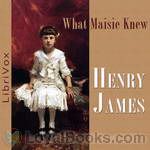 What Maisie Knew
What Maisie Knew
When Beale and Ida Farange are divorced, the court decrees that their only child, the very young Maisie, will shuttle back and forth between them, spending six months of the year with each. The parents are immoral and frivolous, and they use Maisie to intensify their hatred of each other. | |
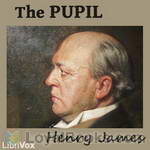 The Pupil
The Pupil
Pemberton, a young American with an Oxford education and out of money, takes a job tutoring Morgan Moreen, the 12-year old son of an American couple living in Europe in a style not quite matched by their income. Morgan, who is highly intelligent, is also precocious and perceptive enough to understand his parents' pretentious aimlessness. Nor, as it happens, do his parents pay Pemberton the salary to which they'd agreed -- shouldn't he be satisfied, after all, by his life with them, and by the joy of tutoring young Morgan? Alternately charmed and put off by the Moreen family, Pemberton is left to choose between his attachment to his young pupil and his need to get on in life. | |
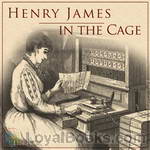 In the Cage
In the Cage
In the Cage is a novella by Henry James, first published as a book in 1898. This long story centers on an unnamed London telegraphist. She deciphers clues to her clients' personal lives from the often cryptic telegrams they submit to her as she sits in the "cage" at the post office. Sensitive and intelligent, the telegraphist eventually finds out more than she may want to know. | |
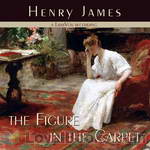 The Figure in the Carpet
The Figure in the Carpet
The story ostensibly concerns a young literary critic who greatly admires the writer Hugh Vereker. A meeting with Vereker, however, shows him that he — and all other critics — have in fact missed the great point of Vereker’s work, and the critic (and his editor) thereupon devote themselves to trying to unravel the mystery. James’s story, however, almost certainly has an autobiographical side to it, perhaps itself criticizing those critics who couldn’t see, or wouldn’t see, the figures lost in the carpet of his own writing. | |